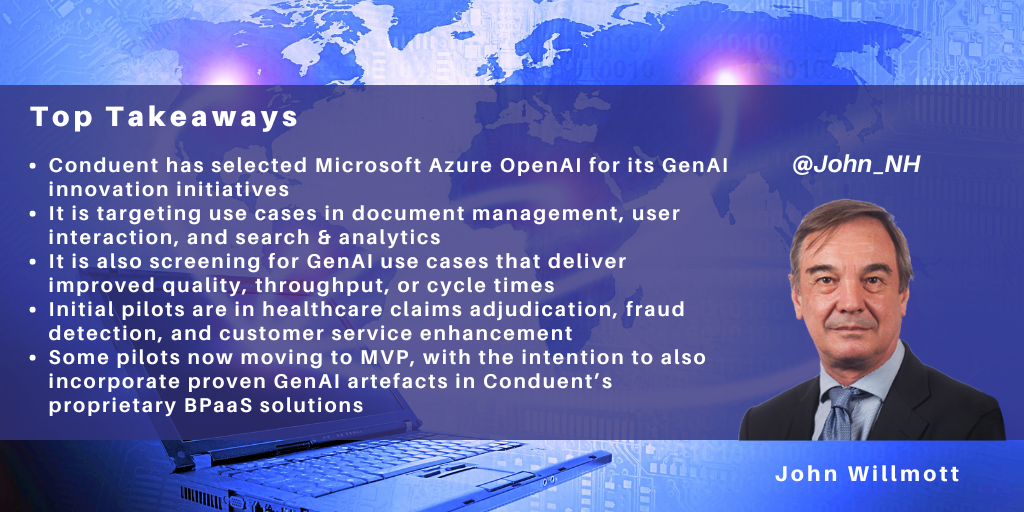Search posts by keywords:
Filter posts by author:
Related Reports
Related NEAT Reports
Other blog posts
posted on May 02, 2024 by John Willmott

Conduent has partnered with Microsoft to use Microsoft Azure OpenAI to underpin its GenAI innovation initiatives with clients.
Its GenAI journey includes:
- Selecting use cases focused on improving quality, throughput, and cycle times
- Adoption of pilots in healthcare claims adjudication, fraud detection, and customer service enhancement
- Subsequently, moving to MVPs and industrializing use cases.
Use Case Selection Criteria Focused on Improving Quality, Throughput, and Cycle Times
Conduent recognizes that GenAI is an expensive technology and that its adoption will typically incur costs in changing existing processes and technology stacks. This makes it difficult to build GenAI business cases on already optimized operations based solely on cost reduction. Hence, Conduent is focusing on “innovative additive opportunities” to make the business case work.
The outcomes that Conduent is targeting from GenAI initiatives are:
- Improved quality, reducing error rates across standardized workflows
- Increased throughput of business process transactions
- Faster cycle times by consolidating value chain steps for faster processing.
At the same time, Conduent’s client relationships tend to involve relatively deep end-to-end service provision across a range of processes rather than single-process support. These combinations of services are tailored for specific clients rather than being standalone commoditized services.
Accordingly, Conduent’s document management services and CX services are generally supplied as part of a wider capability rather than as standalone services. Within this pattern, most of its solutions include elements of:
- Document management, including summarization & analysis, and extracting and contextualizing text within images
- User interaction/call center with multiple clients across various sectors, including enhancing agent assist, virtual agent, and call center agent assessment
- Search & analytics.
These three areas are regarded as core competencies by Conduent and all its GenAI use cases for the immediate future will fall into one of these areas and will be capable of delivering improved quality, throughput, and cycle times.
Initial GenAI PoCs Focus on Healthcare Claims Adjudication, Fraud Detection, and Customer Service Enhancement
Conduent has announced three GenAI pilot areas covering healthcare claims adjudication, state government program fraud detection, and customer service enhancement.
Conduent is a major provider of healthcare claims adjudication services. Here, it is working on a PoC with several healthcare clients to apply GenAI to reduce the error rate in data extraction and achieve faster cycle times in claims adjudication. GenAI is being used within document management to summarize highly unstructured documents, such as appeals documents and medical records, using its contextualization capabilities, including image-to-text. The technologies used are Azure AI Document Intelligence and Azure OpenAI Service.
Secondly, Conduent is working on a fraud detection PoC to support social programs in the U.S. state government sector. This PoC uses GenAI for search & analytics across multiple structured and unstructured data sets to increase the volume and speed of fraud detection. The technologies used here are Azure Data Factory and Azure OpenAI Service.
Finally, Conduent is using GenAI to enhance the use of agent assist and virtual agents by training virtual agents on existing data so that they can be deployed much faster.
Moving to MVPs and Industrializing GenAI Use Cases
Conduent initially undertook PoCs in the above areas to get both Conduent and the client comfortable with the results of applying GenAI and prove the use case. The PoC process is iterative and very granular, and Conduent perceives that organizations need to be extremely prescriptive to get the right results. This typically means defining the specific inputs and outputs of the use case very tightly, including defining what GenAI should do in the absence of individual inputs.
Conduent is now moving towards MVP and building client business cases in several of these pilots, including in some pilots in the document management space. Since Conduent has taken a horizontal approach to its use case selection, many of these have the potential to scale across multiple industry segments and clients.
In addition, Conduent provides BPaaS services to many of its clients, so it is looking to embed proven GenAI use cases in its proprietary technology platforms.
Existing use cases are business unit-sponsored but curated centrally, with the center providing enablement and cross-pollination across business units. However, the intention is to incubate future GenAI capability within individual business units.
